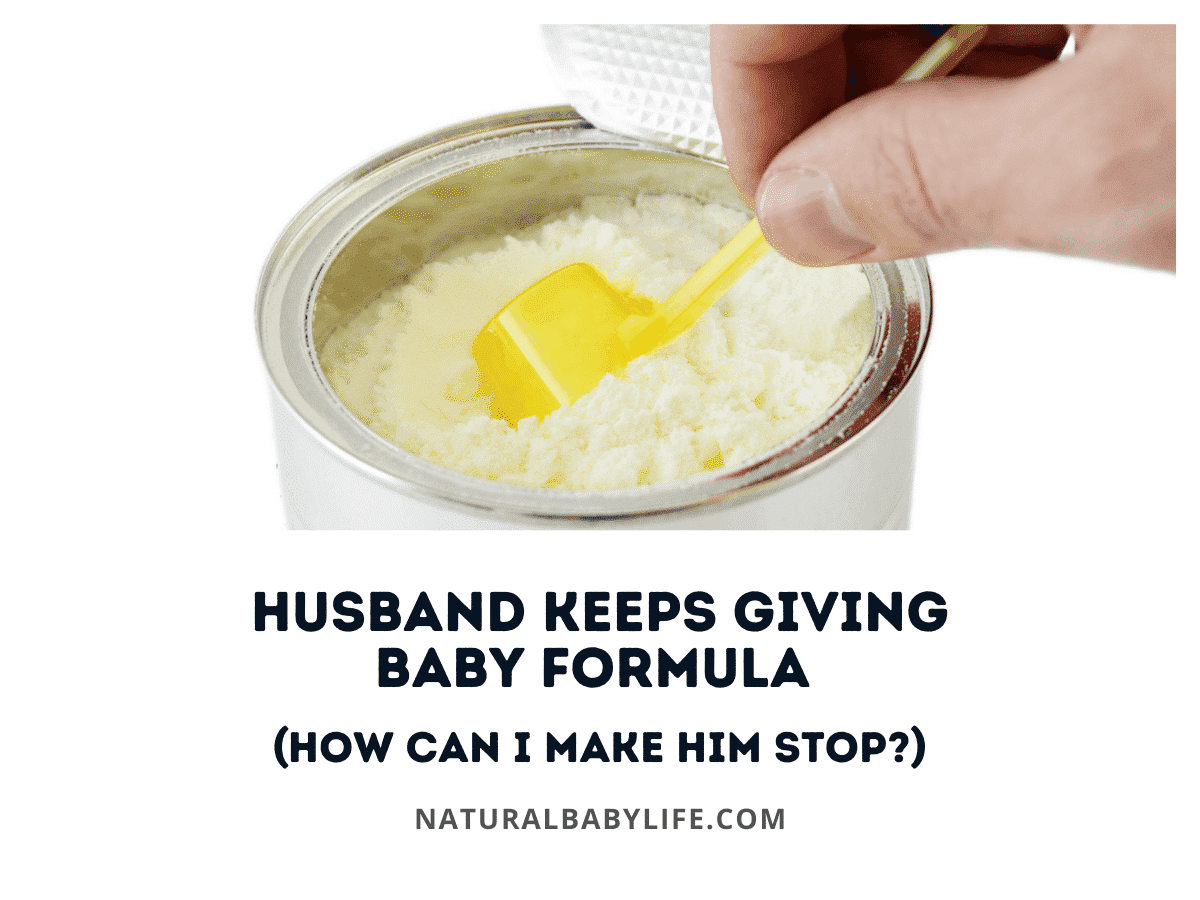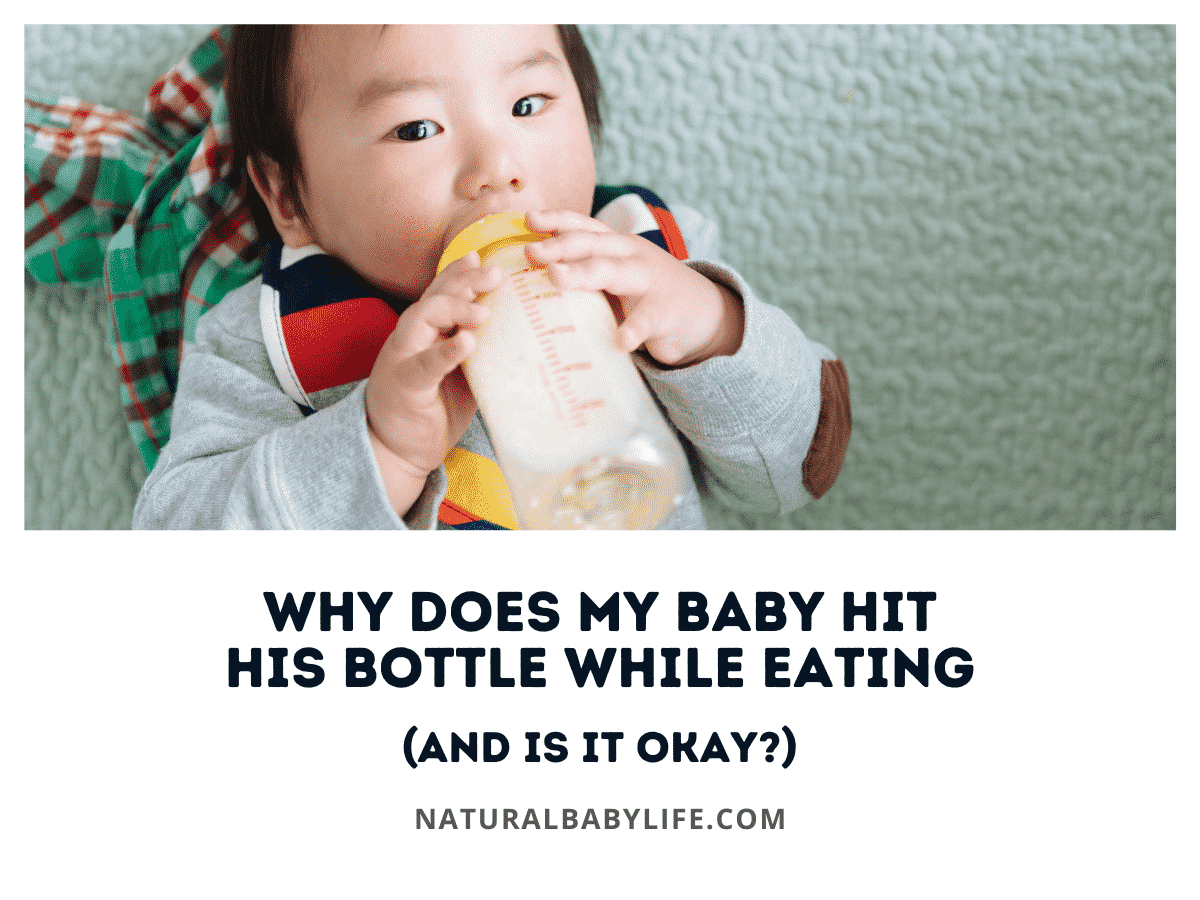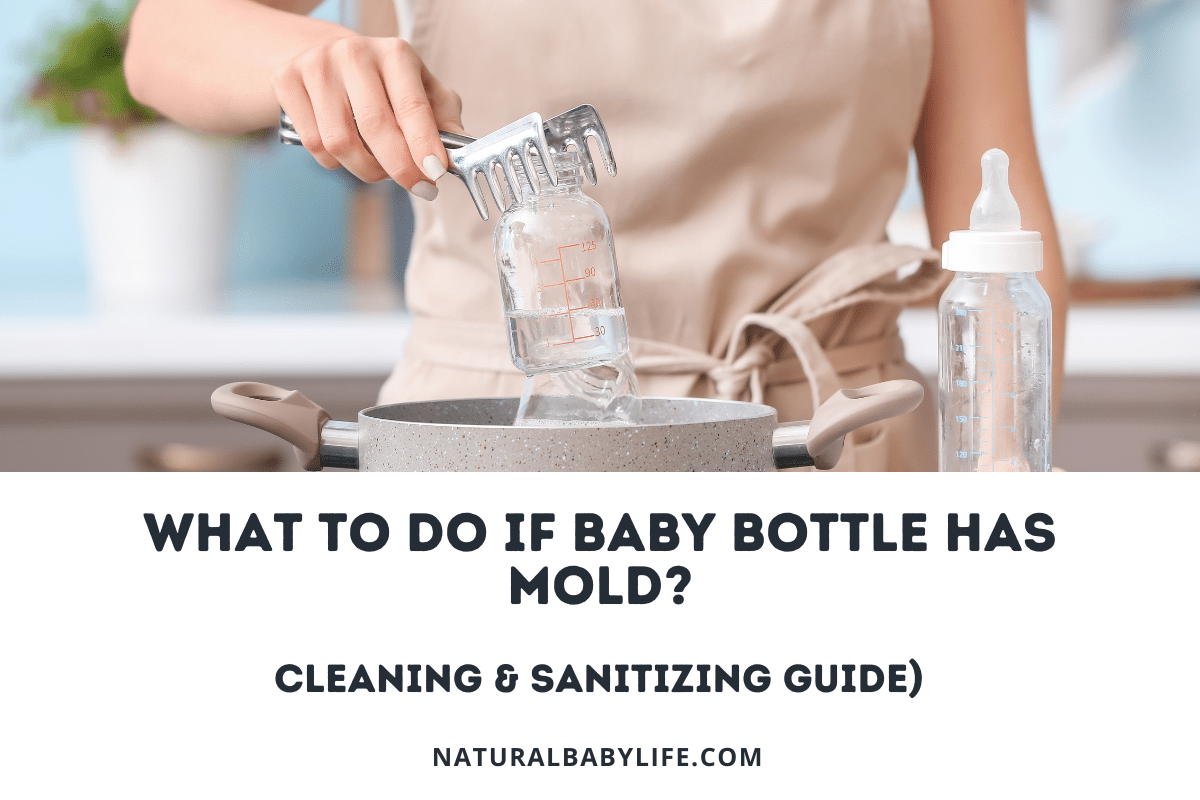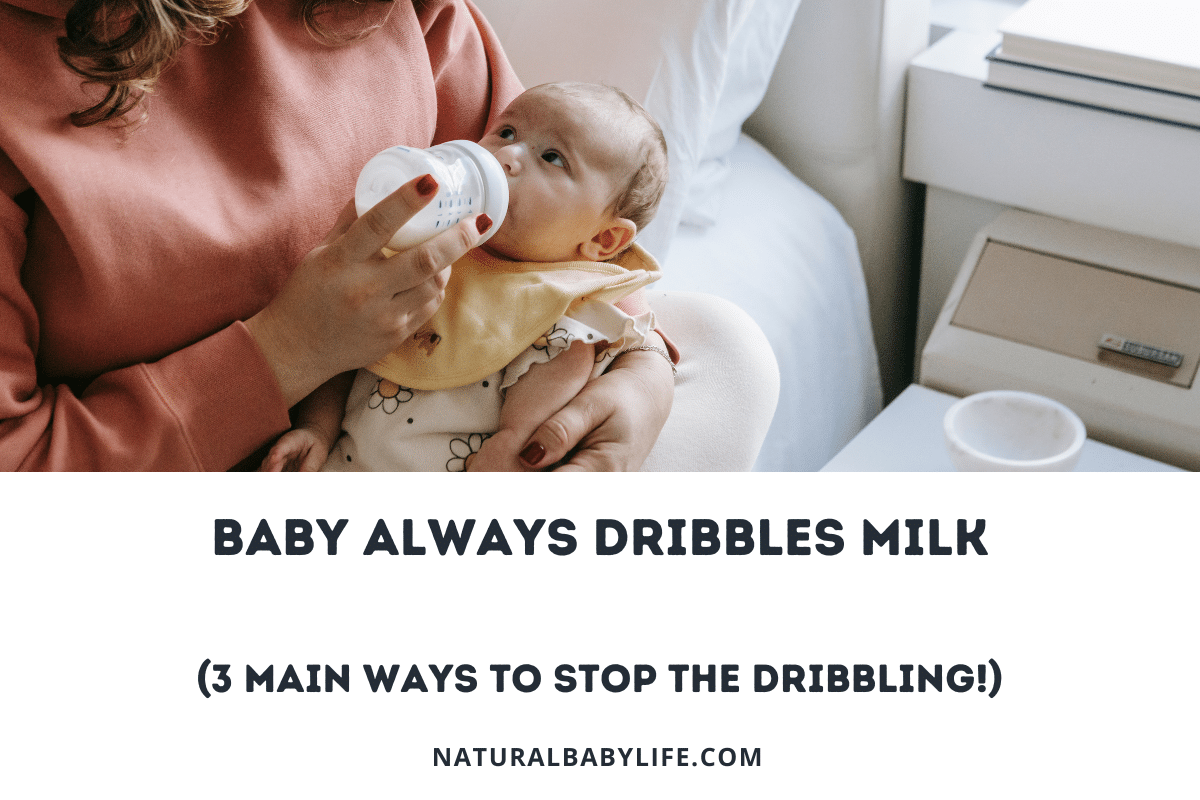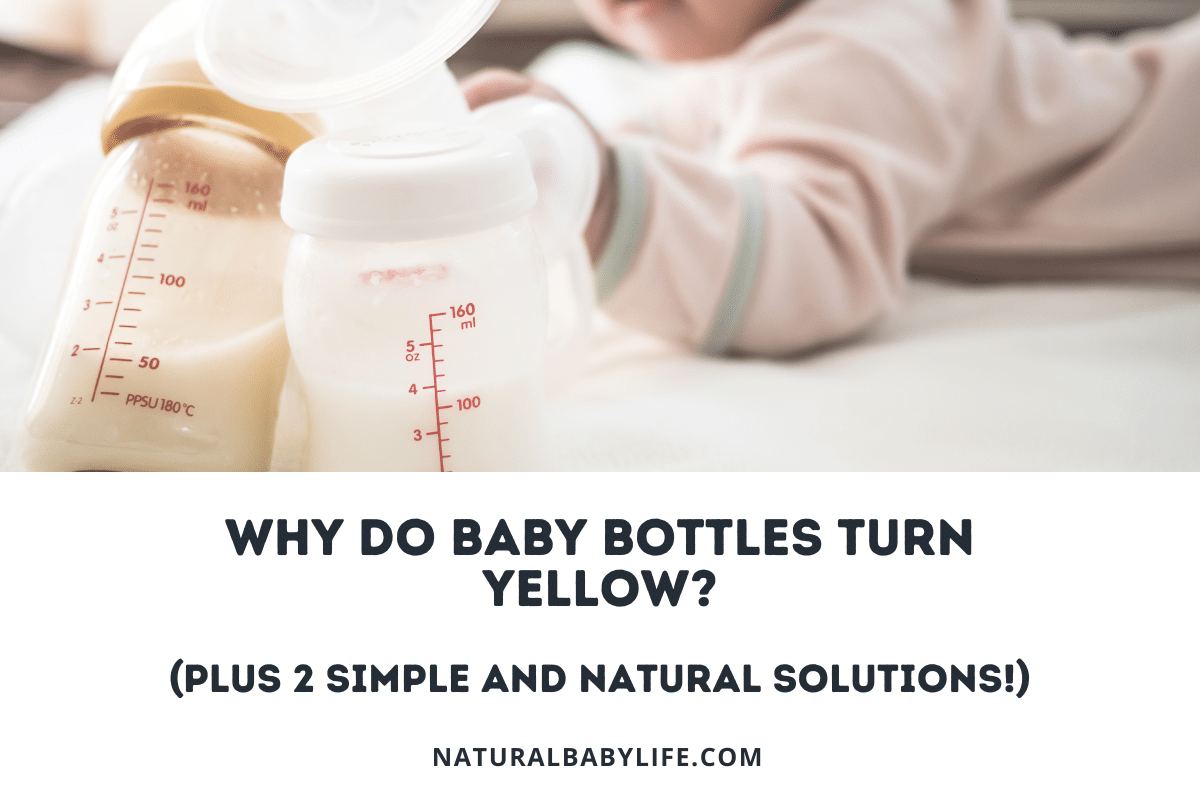Despite the huge popularity of baby formula over the last several generations – chances are good either your mothers or grandmothers were actively discouraged from breastfeeding – twenty-first century mothers are embracing the health and developmental benefits of breastfeeding despite its challenges. But what do you do when dad isn’t on board with the choice to push formula feeding entirely to the side?
Many husbands keep giving their baby formula because they feel it is easier to prepare, they are worried about the baby’s weight gain, they think it is healthier, or they think they are relieving some of a breastfeeding mother’s burden. Explaining the benefits of breastmilk and making it as easy as possible to prepare are the best solutions.
Read on for more insight into the reasons why your husband may be feeding your baby formula, how to successfully supplement with formula when necessary, and how to address the situation without damaging your relationship.
Table of Contents
Husband gives baby formula against my wishes
As new parents, there are going to be times when you and your husband will disagree. The key is to figure out how to discuss these issues together calmly and hopefully come to a shared conclusion or reasonable compromise.
With an emotionally heavy topic such as breastfeeding, it can feel absolutely devastating if your husband goes behind your back or against your wishes to give your baby formula. The decision of whether or not to breastfeed, formula feed, or supplement with formula is an important one. Tensions can run high when an issue like this one has so many emotions attached to it. By carefully discussing and agreeing upon any such issues together, hopefully, your family can prevent any conflict and salvage your relationship without any hurt feelings.
When you are trying to supplement a low supply with formula, even a few ounces of extra formula beyond what you were hoping to give your little one that day can feel like a defeat. And when you are deadset against using formula for your baby, finding out that your little one consumed any formula at all can be extremely frustrating.
At the end of the day, it is important to remember that some breastmilk is better than no breastmilk, your relationship with your husband is more important than a few ounces of formula, and the most important thing is that your baby is fed.
Husband gives breastfed baby formula
Given the known benefits of breastfeeding for both mom and baby, more and more women are choosing to breastfeed exclusively, through nursing, expressed milk, or a combination of both.
Although it can often feel like a burden (especially in the middle of the night!) to be solely responsible for your infant’s feeding and nutrition, moms enjoy certain benefits as well, including the ability to soothe their little one almost immediately. For dad, this inability to soothe so easily – and the potential lack of bonding time that comes with not being responsible for meals – can be frustrating and lead to him making decisions he might not make otherwise, such as reaching for a scoop of formula instead of taking the time to warm and prepare a bottle of expressed milk.
No matter the reason, it’s important to sit down and talk through the issue before resentment and bad feelings develop. The choice to breastfeed exclusively was probably made long before your baby was born and it’s worth having the conversation again whether or not your own views have changed. Find out why dad went for the formula instead of the milk, if there’s anything that can be done in the future to prevent the situation that led to that choice, and establish ground rules for when it’s acceptable to give baby formula (and when it’s really, really not).
What to do when your husband gives formula to breastfed baby
When your husband has given your breastfed baby formula against your wishes, the important thing to remember is that a calm discussion will lead to better understanding and a greater likelihood of resolving the issue effectively. While you may understandably be upset if this was something you thought you had agreed upon ahead of time, it is better to talk once you have calmed down and had some time to think about the issue.
New moms often do several hours of research and have given a great deal of thought to the decisions they make for their little ones, such as whether to breastfeed or give formula. Your husband may not have given quite as much time or thought into this particular decision.
He may not be aware of the advantages of breastmilk over formula (such as increased antibodies, lack of artificial ingredients, and cost savings). Thus, the best place to start in the discussion is to emphasize the benefits of breastfeeding and reiterate why you made this decision for your baby.
Is breastfeeding better than formula?
You’ve probably heard the saying, “breast is best,” but both breastfeeding and formula feeding have their own unique advantages and disadvantages. The answer to the question of which is better is going to vary depending on what works best for your family.
Advantages of breastfeeding your baby include:
- Breastmilk is nutrient-rich and more easily digested than formula (which means less constipation and gas).
- The antibodies that pass from mom to baby can help provide the little against disease and infections.
- It could help lower the risk of SIDS.
- Breastfed babies may actually be smarter.
- Breast milk may even help your child in later years, by reducing the risk of being overweight, and of developing asthma, diabetes, high cholesterol, Hodgkin’s disease, leukemia, and lymphoma.
- It’s cheaper than formula feeding, although it is important that mom watches her diet while breastfeeding.
- Bonding time for mom and baby.
Formula feeding does have some benefits that breastfeeding lacks:
- More freedom for mom, and shared feeding responsibilities with other family members. Although pumping does allow dad to help with feeding times, mom is still responsible for producing, expressing, and packaging the milk.
- Most formula recipes include vitamin D, which is essential for baby’s development and not supplied in appropriate quantities by breastmilk.
- Formula comes in different varieties, including a lactose-free option for baby’s who are sensitive to the proteins in milk, and an option specifically designed for baby’s with reflux.
- Bonding time with dad!
Is breastfeeding and formula feeding okay?
Before baby’s birth, it is easy for expectant – and especially first-time parents – to have big plans for raising their little one: the perfect (and perfectly clean) nursery, the pristine outfits, and the plan to breastfeed baby 100% of the time. Then baby comes, dad goes back to work, mom is exhausted and overwhelmed, soiled laundry piles up in the basket beside the changing table, and mom and dad start to think maybe formula isn’t that bad of an idea.
Many families ultimately resort to a combination of breastfeeding and formula feeding for a variety of reasons. There are times when (despite a mother’s best efforts) the milk production just doesn’t catch up to baby’s demand. In other cases, choosing to supplement may be a lifestyle decision such as when a mother travels often and transporting pumped milk is a logistical challenge.
The AAP recommends breastfeeding exclusively for the first six months, although that’s not always feasible, especially if mom is having trouble keeping her supply up.
Some parents will use formula to “top off” a meal once the baby has gotten all he can from the breast, while others choose to nurse when mom is home and give formula when baby is with dad or another caregiver. Either way, families who do wind up supplementing breastmilk with formula usually have the best luck if they introduce formula after a successful breastfeeding relationship has been established.
While breastmilk is nutritionally best for baby (especially during the first six months), it is important to balance all the other household factors when deciding when, if, and how much to supplement with formula, and to keep in mind that some breastmilk is better than none at all.
Husband gives baby formula instead of pumped milk
When it’s time to go back to work, many moms will take the extra time and effort to pump, store, and transport milk home so their baby can enjoy the nutritional benefits of breastmilk even without the breast itself.
When dad doesn’t understand the amount of effort mom put into that little bag of breastmilk, its importance to both her and the baby, and the reasons behind all the extra work, it can be easy to think that thawing and preparing it isn’t worth the trouble compared to the relative ease of creating a bottle of formula.
If your husband is defaulting to baby formula instead of pumped milk – especially if you have agreed that formula feeding should be the last option – it’s important to find out his reasons and come to a new agreement. He may be concerned about going through all the expressed milk because baby is hungry (remind him you make more every day), he may think formula is healthier (ask him why he thinks that), or he may have forgotten how much formula costs (not only is the can itself expensive, you’re not getting a good value out of your breastpump).
What to do when husband gives formula instead of expressed milk
There’s nothing you can do to change the past or take back your husband’s decision to use formula instead of expressed milk. However, you can broach the topic with him calmly and make a plan for the future.
Begin by thanking him for what a wonderful father he is and how much he clearly cares for your little one. Then you can gently remind him of some of the reasons why you want to make sure your pumped milk is used instead of formula going forward. Remind him that formula is expensive, you worked hard at preparing the expressed milk, and you don’t want your pumped milk to go bad. He simply may not have been aware of how much time and effort it takes to pump a few ounces of milk.
To avoid further issues, try to eliminate as many steps as possible by thawing frozen breastmilk ahead of time and portioning it out into bottles for him to use. Make it very clear for him exactly where you will keep the pumped milk for him to use, and that all he needs to do is give your baby the bottle directly (or how to warm it up if your little one prefers it that way).
Is expressed breastmilk better than formula?
Expressed breastmilk carries all the same benefits as formula and thus a bottle of pumped milk is still a better choice for baby than a bottle of formula.
Pumped milk can offer parents the “best of both worlds” by allowing other caregivers to help give baby a bottle without having to resort to commercial formulas with artificial ingredients. Giving pumped breastmilk also gives nursing moms other freedoms such as the ability to share nighttime feedings with a partner, travel, and work outside of the home.
Many working moms over the years have maintained a successful breastfeeding relationship through pumping, and the expression of breastmilk while on the job is even protected under U.S. federal law.
Does breastmilk lose nutrients when pumped?
The act of pumping itself does not cause any changes to your breastmilk, however, nutrients may break down over time with storage.
Even so, stored breastmilk still contains more nutrients, antibodies, and antioxidants than formula.
Unless the breastmilk has actually gone bad, it is likely to be better for your little one than a bottle of formula.
Husband gives baby too much formula
When a mother and baby are supplementing with formula, it can be hard to get the balance just right.
Giving too much formula can affect a mother’s supply (which is largely based on demand) and giving too little can result in an underfed baby. Successful combination feeding requires that other caregivers such as grandparents and spouses are informed of the plan and fully onboard.
So what about if you feel your husband is overfeeding the baby? Maybe you’re struggling with a low supply and were really hoping to nurse your little one at the breast again tonight, but your husband gave more formula than you expected. Or perhaps you are combination feeding and your husband seems to be going through formula much faster than when you are around.
There are a number of reasons why this could be occurring. Sometimes dads may be tempted to give baby more formula in addition to their regular feedings in order to stop their crying. Or they may feel that your little one is not getting enough to eat and so they prepare another bottle.
Either way, if you are a mother who is struggling with your husband giving your baby too much formula, it is important to communicate with respect and assume good intentions.
What to do when dad overfeeds baby
The best thing to do is to discuss the issue with your partner and make a plan that you can both agree with.
Discussing different circumstances ahead of time will help your husband know exactly what to do when he encounters certain situations like your little one crying even after they’ve finished their whole bottle.
For example, if your husband overfeeding the baby while you are gone is a frequent issue, help equip him with other tools to care for her besides just giving a bottle.
Can you give a baby too much formula?
Is it even possible for a baby to consume too much formula?
Believe it or not, overfeeding IS possible. It can happen because a caregiver missed fullness cues, because your baby drank too quickly, or simply because your little one wanted to suck for comfort or to fall asleep.
What happens if a baby drinks too much formula?
It may sound alarming at first that your baby could be drinking too much formula.
While overfeeding may come with a whole host of inconveniences like increased burping and more frequent bowel movements, the good news is that it is not especially dangerous. If it becomes a pattern, however, it can lead to increased weight gain and a great chance at obesity.
According to the American Academy of Pediatrics, formula-fed babies should consume 2½ ounces of formula a day for every pound of body weight. Don’t forget to take into consideration any breastmilk they may be receiving throughout the day as well.
Overfeeding can be prevented by paying close attention to your baby’s feeding cues, offering a pacifier when you suspect your little one is no longer hungry but wishes to suck, and finding new ways to help soothe your baby to sleep such as rocking or swaddling.
Husband Just Won’t Listen To My Wishes
Understanding the reasons behind your spouse’s actions is the first step towards productive communication and conflict resolution. It can be hard to address an issue if both sides haven’t had a chance to sit down and really get to the bottom of why each party feels the way they do.
There are a number of reasons why your spouse may be defaulting to formula when feeding your baby. Some of these reasons include a desire to bond with your baby, a belief that formula is healthier, lack of knowledge of how to prepare stored breastmilk, a desire to feel involved in parenting decisions, or even out of concern for seeing you struggle with a difficult breastfeeding relationship. Once you know the reasons for your husband’s actions, you can work on creating a compromise or solution that works for both of you and address both of your concerns.
If you have tried all of that, it may be time to bring in outside help such as a pediatrician, lactation consultant, local La Leche League group, postpartum doula, or knowledgeable family member. These professionals can often make recommendations for things that can help resolve any nursing issues. Schedule adjustments, workplace accommodations for pumping, the right training on latch, access to the right equipment such as breastmilk storage freezers or hospital-grade pumps, can make all the difference.
Receiving the counsel of others may even help bring a reluctant spouse on board to the vision you have for your breastfeeding journey. Although you may have done the hours of research, consider that your spouse likely hasn’t, and they just want to ensure that the best possible decision is being made for your family.
In some cases though, you may need to learn how to pick your battles and just work at trying your best to breastfeed as much as possible when you can. At the end of the day, your family is what’s most important and this issue could be just the first of many issues you will disagree on over the years as parents.

